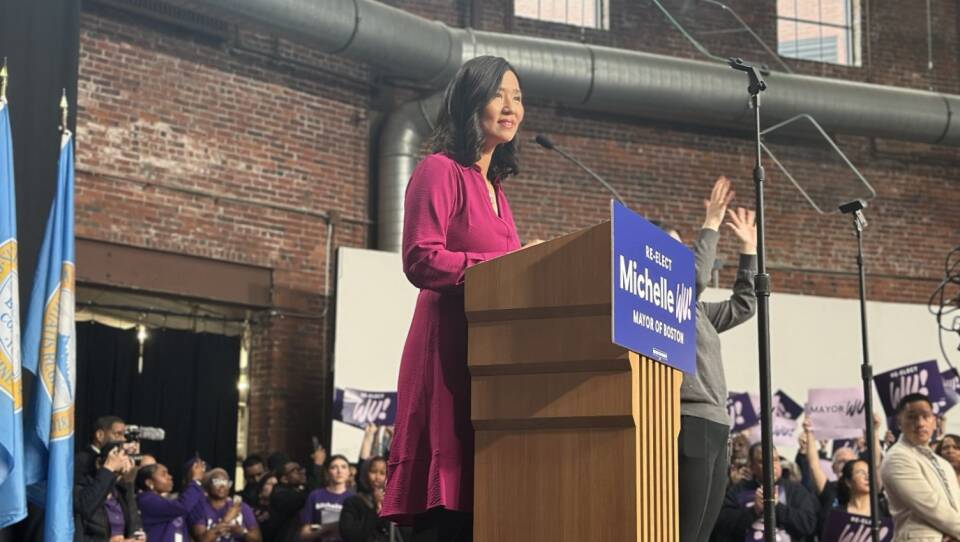Boston Mayor Michelle Wu made her bid for re-election official Saturday, emphasizing inclusiveness, experience and opposition to President Donald Trump to a crowd of supporters holding signs of jewel-toned purple and lavender.
“Four years ago, none of us could’ve imagined what these past three months have looked like,” Wu said to a crowd of about 1,200, according to her press team. “It’s not just our country that are under attack, it’s communities like ours, our lives and our livelihoods. Our identities and our independence. It feels like everything that makes Boston, Boston is being threatened by an administration that is clearly threatened by who we are as a city.”
“We face serious challenges in this moment and now is not the time for a mayor who needs on the job training,” Wu said to cheers.
The mayor launched the campaign from the Cyclorama, the same South End venue where she celebrated victory nearly four years before. She noted the venue’s history as a theater of the 1800s, built to show an immersive painting of the Battle of Gettysburg.
“In this space and for generations across our city, Boston has always been in the middle of the battle for freedom and for our future,” she said.
Wu was welcomed to stage by U.S. Rep. Ayanna Pressley, who announced her endorsement for the mayor Saturday. Pressley called Wu a “strong and steady force for good,” who confidently challenges the way things have always been.
“At times, it can be lonely to be a first or only in a role and Michelle was eager to get it right,” Pressley said, reflecting on Wu’s position as Boston’s first elected woman and non-white mayor. Wu also recently became the first Boston mayor to give birth while in office, a novelty that Wu has brought to the public with several high-profile appearances with her nearly 3-month-old daughter, Mira.
“Daily, she makes universal experiences like caregiving for a parent or a child visible, and normalized,” Pressley said of Wu. “She knows what it’s like to be the daughter of immigrants. She knows what it’s like to redefine leadership and, in doing so, empower thousands to step into their own.”
Wu’s re-election can be seen as a test of one of the norms of Boston politics: that incumbent candidates generally beat out their challengers by wide margins, thanks to the power of the seat, the media attention and the well-stablished connections that yield votes.
Wu enters the race facing two challengers: Josh Kraft, former head of the Boys and Girls Club of Boston and son of billionaire Patriots owner Robert Kraft; and local activist Domingos DaRosa. A third, developer Thomas O’Brien recently weighed a bid, ultimately deciding against it.
Wu, who made headlines for her remarks in defiance of the Trump administration at her annual State of the City speech last month, softened her rhetoric on Washington for her campaign re-election address, taking aim instead at her local opponents.
“Now is certainly not the time to hand the keys over to billionaires or developers,” Wu said. “Boston doesn’t need a mayor who has to recuse themselves from conflicts of interest,” she said, hitting at Kraft, who has said he would take that step if elected to the mayoralty as his family negotiates a soccer stadium proposal in Everett.
“We need a mayor whose only interest is Boston,” she said.
Less than two miles away, at Roxbury Community College, Josh Kraft attended an event his campaign billed as dedicated to Black culture. Later, Kraft hit back at Wu in a statement knocking the mayor as a lofty-speaking elitist, hosting an event at “an exclusive private venue which hosts gatherings for Uber, Google, Apple, Harvard and Louis Vuitton,” the statement said.
“Mayor Wu has taken an ideology-first, results-second approach to governing. The results? Record high rents and home prices,” Kraft’s statement said, adding that the city has spent “on poorly designed and hastily installed bike lanes clogging our streets” and currently has “an election department in state receivership.”
Kraft also listed a number of failed campaign proposals from her 2021 bid including an elected school committee — which nearly 80% of Boston voters approved in a referendum the same year as her election — free MBTA access and the institution of rent control.
The mayor arrived at her campaign kickoff after appearing at a “Hands Off” rally — part of a mass-action collection of protests aimed at showing dissatisfaction with President Donald Trump and special appointee Elon Musk — at City Hall Plaza.





